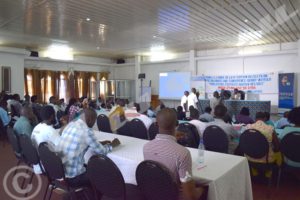Obstetric fistula is both preventable and curable. Ending it in Burundi is mainly hindered by ignorance.

Attendees of the conference-debate on ending fistula organised by UNFPA
The United Nations Population Fund (UNFPA) officials in Burundi say the public lacks basic knowledge about obstetric fistula. Many people don’t know how to prevent it. They are not even aware that it can be treated.
Obstetric fistula is “little known to the public” says, Dr Pierre Kacou Konan, the UNFPA Country Officer in Burundi.
Due to ignorance of the existence of treatment, some women live with the health condition for decades.
“I lived with obstetric fistula for 20 years before I knew it could be treated”, says Thérèse Nyamukinga in her fifties from Ruyigi eastern province. She says she was healed only two weeks after she started receiving treatment.
To celebrate the International Day to End Obstetric Fistula this 23 May, UNFPA-Burundi has organized a conference-debate for audio-visual artists, communicators and journalists. UNFPA seeks to rally them to the dissemination of information about obstetric fistula.
Dr Kacou encouraged media professionals to multiply contents related to obstetric fistula. “Talking about it is saving lives”, he says.
According to Fistula Foundation, “an obstetric fistula is a hole between the vagina and rectum or bladder that is caused by prolonged obstructed labour, leaving a woman incontinent of urine or feces or both”.
A 2013 study by UNFPA revealed that 3350 Burundian women suffered from fistula and that 750 new cases occurred each year.
Dr Yolande Magonyagi, Manager of Family Planning Progamme within the UNFPA in Burundi, says causes leading to the prolonged obstructed labour are among others, premature marriages or giving birth at home when emergency obstetric care was necessary.
People living in remote rural areas where there are no hospitals or medical centres are at great risks.
Dr Magonyagi says obstetric fistula “is a mirror that reflects the quality of emergency obstetric care”.
The underlying cause is poverty that causes premature marriages or malnutrition and hinders access to quality emergency obstetric care.
More than 47 per cent of women treated for obstetric fistula come from provinces of Cibitoke, Kirundo, Muyinga, Ngozi and Makamba.
Far-reaching consequences
Sufferers of fistula are subject to stigma, discrimination and isolation. “It may happen that husbands divorce their wives with fistula, refuse to sleep together with them or take second wives”, says Dr Magonyagi.
To the social consequences add economic and health problems. Fistula can “lead to frequent ulcerations and infections, kidney disease and even death” according to Fight Fistula organisation.
Incontinence hinders fistula sufferers from working, causing them to be economically dependent.
Obstetric fistula is fatal for babies in most of the cases. Dr Magonyagi says 62. 6 per cent of babies of women who have come to Urumuri fistula treatment Centre died.
The death rate is generally as high as 90 per cent according to Fight Fistula.
“Informing people about obstetric fistula will help save lives”, says Dr Magonyagi. “It is important to inform the public about suggestive signs of fistula. This will encourage affected women to seek treatment”, she says.
Currently, Burundi has only three fistula surgeons, two women and one man.



















 IWACU Open Data
IWACU Open Data

